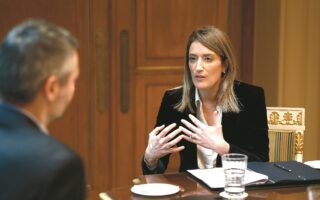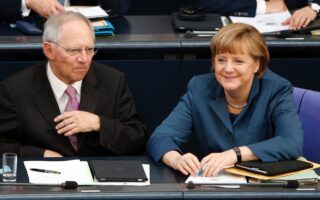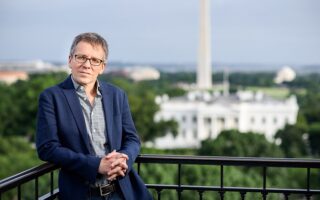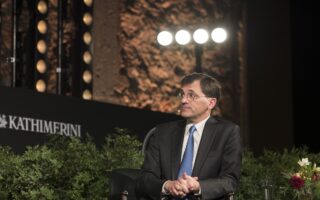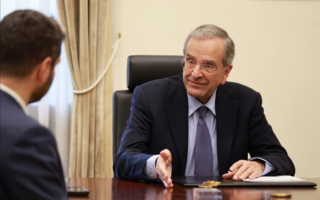From Kaisariani to Strasbourg
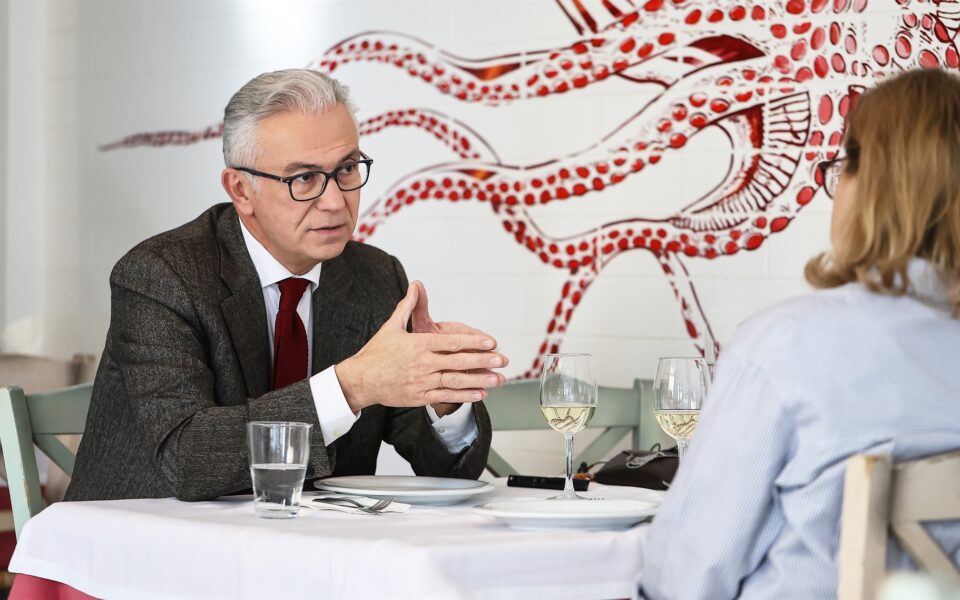
“Hello, Mr Roussopoulos. Congratulations!” said a customer from another table at the taverna in Ilioupoli, where Kathimerini met on Tuesday with the first Greek politician to be unanimously elected the 35th president of the Parliamentary Assembly of the Council of Europe (PACE). The customer was not the only one to congratulate him. At journalist and politician Dimitris Tsiodras’ book launch on Monday evening (“European Integration: The Adventures of a Vision”), where Roussopoulos was a speaker, he received kudos from hundreds of people for his new position, both from famous and not-so-famous people in attendance.
In 2008, Roussopoulos served as state minister and government spokesperson for the New Democracy government under Kostas Karamanlis. He was criticized for his alleged role in a scandal involving a property swap between the Vatopedi Monastery in the monastic community of Mount Athos in northern Greece and the Greek state. He resigned from office to prepare his defense, and ultimately remained away from politics for 10 years. He was acquitted by the judiciary in 2017.
Now, the entire Greek political world is united in favor of his success. One could say that his re-election to Parliament in 2019 was a kind of vindication for the 10 difficult years he chose to spend outside politics.
Winning the position of PACE president, which was voted upon by 46 member-states, including countries such as the United Kingdom, Turkey and Azerbaijan, is a recognition of international standing. I wondered how one feels having experienced these political twists and turns. How do you stand before those who once threw mud at you and now pat you on the back?
I avoided the temptation to ask this question first because another one preceded it: What is this institution, the Parliamentary Assembly of the Council of Europe, founded in 1949, that has both political and symbolic power?
“It is the first with a pan-European scope, as an idea from Winston Churchill, Konrad Adenauer and other politicians who were then instrumental in the creation of the European Coal and Steel Community. In summary, it could be seen as the ‘UN of Europe’ with 612 full and alternate members from elected national parliamentarians of 46 states, including the 27 that make up the European Union. It focuses on defending democracy, human rights and the rule of law. It produces conventions on extremely important issues, such as the Istanbul Convention on equal rights for men and women. The Convention on Artificial Intelligence is now in preparation. The Council’s Parliamentary Assembly also elects the judges to the European Court of Human Rights.”
The representation of each country is proportional to its population. The Council’s nine committees also play an important role. Roussopoulos had served as chairman of PACE’s Committee on Migration, Refugees and Displaced Persons, and as vice chairman of the European People’s Party, he also chaired sub-meetings to draft reports on important issues. In some of them he managed to find a balance in very complex situations.
“This previous experience definitely played a role in enabling me to apply for the position successfully, because I had demonstrated my skills, I was known, I had consistent attendance and involvement in issues that sometimes put Greece in a difficult position, such as the pushbacks. It is important to be able to deal with these issues with a straightforward and effective approach, so that others can see that you want to defend European values as well, not just your own country’s values. I think I have accomplished that,” he stresses.
Did his previous work in journalism and politics help him to develop his negotiating skills? “Of course. I have met and interacted with great figures in Greece and abroad, leaders who left their imprint on history. You learn a lot by observing them, but also certainly by reading constantly – I was and remain an avid reader,” he says, taking a sip of white wine. I wonder aloud what it is that made a hugely successful journalist in both print and television “cross over to the other side” from journalism to politics. Because, let’s face it, in Greece, media people enjoy much more immunity compared to politicians. When they decide to cross the Rubicon, the public’s perception of communicating vessels amplifies, making them more exposed to criticism. So?
“When I became minister of state, one of my teachers from the Kaisariani high school where I graduated, philologist Vassilis Potios, a model teacher for me, sent me a questionnaire that I had completed at the age of 15: To the question ‘What do you want to be in the future?’ I had answered, ‘A journalist.’ And to the question ‘What would be an unattainable dream for you?’ I had answered with one word, ‘Politics.’ It was something I had in me from a young age, plus the fact that my generation, growing up in the 1970s, had a very strong connection with politics. My father, a postman by trade, had fought in the Civil War against his own brother, as was the case in many Greek families. He raised me and my many brothers and sisters on the principle that national division is the worst thing that can occur. He believed in consensus, not polarization, something that he passed on to me.”
‘My wife endured a great deal. We faced the ordeal hand in hand’
Was there bitterness in your marriage during those 10 years? “Yes, of course there was. I went through two commissions of inquiry and a preliminary inquiry by two governments, I was almost referred to the Special Court, I was under constant attack for a long time. Of course, in the plenary session of the Parliament, members of KKE, SYRIZA, LAOS and some members of the PASOK party, that is, my political opponents, voted for my acquittal. However, I believe that the worst thing is what my wife and children have suffered. I remember my son saying to me, ‘Dad, don’t take me to school because there are too many photographers and I don’t want to go.’
“I met my wife Mara Zacharea while she was a journalist. She then finished law school, went to do postgraduate work in England and then worked for the BBC. After I entered politics in 2000, I remember some people wondering, ‘Why is the minister’s wife working in television?’ [Belgian journalist] Christine Ockrent and Anne Sinclair in France also faced criticism about their husbands’ occupations. But not only did they continue to do their jobs, they went on to get even higher positions than before.”
“Mara endured a great deal,” he continues. “We faced the ordeal hand in hand. At some point we were both unemployed. I then had to sell off half of my assets that I had acquired from my work as a journalist. When I stepped away from politics, Mara started all over again, from a show on a music radio station, to working for a website, to becoming a news anchor and she’s now the only female news director on a private TV channel. What kept me calm during that decade was my unshakable belief that I would be vindicated. You can say that my religious beliefs also played a role. And indeed I was. People have twice re-elected me after I had been away for 10 years. Now I got this new position but it came with lots of hard work on my part. But I think, above all, what kept me going was not only my clear conscience, but the sense that I entered politics to give back. Because as a journalist I had both readership and more money. Despite all I went through, however, my love for politics did not fade. Perhaps because as a politician there are times when you shout and no one listens and times when you whisper and everyone listens. I was lucky enough to experience both.”
‘I was being deleted’
What is to blame for all that is happening in the Greek political scene with cases like Vatopedi or the Novartis bribery scandal? “People say that the fish stinks from the head. But is that the case? Do the people have no responsibility for who they vote for? Are they exempt? Who brings populists to power? I think that whoever is in politics shows sooner or later what they stand for. I set my own personal example when I stood up for my principles and paid the price. Today I have the moral satisfaction for the stance I took. And that was the reward for the tremendous ordeal I went through. I remember, when the Vatopedi scandal broke, how many in my party – and many others – looked at me askance; they did not want to know me. Some of those close to me even deleted photos of us side by side posted on the internet. The funny thing is also that some of them were the first to congratulate me on my new post.”
Milestones – Theodoros Roussopoulos
1963 – Born in Kyparissia.
1981 – Studies journalism, works at Eleftherotypia.
1989 – Meets his future wife Mara Zacharea.
1996 – His son Vassilis is born.
2000 – Enters politics, his daughter Anna is born.
2004 – Elected as a member of Parliament, sworn in as state minister in the government of Kostas Karamanlis (New Democracy).
2014 – Awarded a PhD in history by the University of Edinburgh.
2019 – Returns to politics.
2024 – Becomes the first Greek politician to be elected president of a major international organization.
